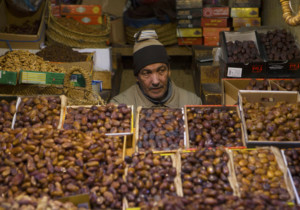What is Pessah?

On the 15th of Nisan, the Hebrew calendar, begins a major and biblically derived Jewish holiday named Passover (i.e. Pessah). It refers to God “passing over” Jewish households during the 10th plague in Egypt, killing all of the first born but theirs. These sacred days celebrate freedom and commemorate the story of the Exodus from Egypt. The Exodus is the deliverance of the Jewish people by God and led by Moses. It’s seen as a strong metaphor that’s acknowledged not only by Jews but also by people of all faiths. Jewish celebrations are not only rich in history but also in traditions. The Moroccan Pessah is no exception.
How is it celebrated ?
The main event is the Seder meal during which they recite the Haggadah (story of the exodus). The traditional Seder plate contains seven necessary elements which are used as symbols during the reading:
- 3 Matsots: unleavened bread is placed in the centre one on top of the other. Each one wrapped separately
- Karpass: a green herb generally celeriac or parsley
- Salty water: reminds the tears shed by the children of Israel during their enslavement
- Maror: bitter herbs recalls the hard life in Egypt such as lettuce or horseradish
- Harosset: a mixture of apple, cinnamon and walnuts in wine symbol of the mortar used by the Jewish slaves to make bricks
- Zeroa: a bone of grilled meat symbolises ancient Passover sacrifice (i.e. the Paschal Lamb)
- Beytsa: a hard egg, in memory of the destruction of the Jerusalem Temple

Four cups of wine (or grape juice) are drunk at specific moments during the Seder supper. A dinner is also served meticulously laid table. This beautiful array of food symbolises freedom.
Origins of Mimouna
The origin of Mimouna is uncertain but some link this celebratory dinner back to the famous Rabbi Maïmon (Moïse Maïmonide). Maimon is one of the most eminent Rabbis of the Middle Ages. He studied in the oldest university in the world, University Al Quaraouiyine that has recently been refurbished and can be visited. It is conveniently located 200m from the Palais Amani.
Mimouna at Fez Cooking School
Our Sephardic Cooking Workshops introduces the Mimouna tradition. In our workshops we work towards honouring this fascinating Moroccan Jewish heritage. If you a passionate about cooking, sign up for one of our workshops in our Fez Cooking School. You will get to learn about a new culinary tradition.
NB, April 18th 2019

